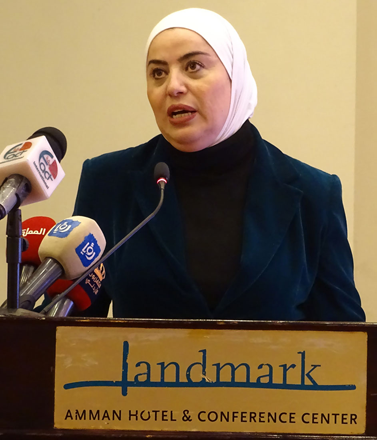You are here
Bani Mustafa calls for adoption of workplace code of conduct in private sector
By Rana Husseini - Oct 31,2022 - Last updated at Oct 31,2022

Minister of Social Development Wafa Bani Mustafa speaks at a local conference to boost women’s participation in the private sector on Monday (Petra photo)
AMMAN — Minister of Social Development Wafa Bani Mustafa called on the private sector to adopt a code of conduct that would ensure a friendly work environment for working women.
“Women still face many challenges in the workplace that are considered barriers for them to assume leadership positions,” Bani Mustafa said.
That is why, the minister added, “the private sector and banks need to adopt measures that would boost women’s presence in the workplace such as activating the flex hours system and establishing nurseries at their establishment.”
The minister’s remarks were made during a local conference to boost women’s participation in the private sector on Monday, which also witnessed the launch of the “Breaking the glass ceiling, the launch event of The Guidelines for Leadership and Skills Development of Women in the Private Sector” programme.
Bani Mustafa, who is also chairperson of the Inter-Ministerial Committee for Women’s Empowerment, acted as patron to the event.
The minister also stressed the need to ensure “more legal justice for women, especially the legislation that is related to women’s participation in the labour market”.
The event is part of the UN Women and International Labour Organisation (ILO) under the joint programme “Promoting Productive Employment and Decent Work for Women in Egypt, Jordan and Palestine”.
The event, which was held at the Landmark Amman Hotel, was funded by the Swedish International Development Cooperation Agency (Sida).
At publicly listed companies in Jordan, women hold 21 per cent of senior management positions, according to a UN 2020 report.
In addition, the report stated that “despite all efforts, women in Jordan still hold under 5 per cent of board positions and around 78 per cent have no women on their boards”.
Meanwhile, for private shareholding companies, female members constitute only 9.1 per cent of senior management and only 2.6 per cent of those companies have female chairs, the report stated.
Jordan’s numbers in this regard are among the lowest in the world, even in comparison with other countries in the Middle East, according to the UN report.
Aisha Mukhtar, UN Women deputy representative, pointed out that women’s leadership participation in the MENA region and North Africa is at “2.4 per cent in comparison to the world figure, which stands at 26 per cent”.
Mukhtar also stressed that empowering women’s labour participation will reflect positively on many nations from a financial and qualitative point.
Meanwhile, Reem Aslan, gender technical specialist, in the ILO’s regional office for Arab States said that the ILO has recently published “Violence and harassment at work: A practical guide for employers”.
“This guide focuses on the prevention and management of violence and harassment at work, with reference to the ILO Violence and Harassment Convention [No. 190] and its accompanying Recommendation [No. 206], 2019,” Aslan told the gathering.
“Although there is no article in Jordanian labour law that requires enterprises to adopt policies to protect women and men from all forms of violence and harassment, it was obvious during today’s session that most of the participating enterprises had some form of a policy or measure in place to ensure their employees enjoy a safe work environment,” Aslan said.
Also, the ILO and its social partners have established a national team, and have drafted a national strategy to eliminate violence and harassment in the workplace, Aslan stated.
It also conducted a legal gap analysis that could inform any future legislative amendments under labour laws, social protection laws, the penal code and others, Aslan added.
The sessions focused on discussing the guidelines for leadership and skill development of women in the private sector, as well as for prioritising the building of an inclusive, gender-equitable work culture.
Other sessions tackled means of creating an enabling, safe, flexible and equitable work environment and methods to train, mentor and sponsor women with leadership ambition and potential.
The Kingdom ranked 145th out of 146 countries with regard to women’s participation in the labour force, according to the Global Gender Gap Report 2022.
The report also indicates that Jordan maintained almost the same score as last year, of 0.639, or 122nd in the world. The Kingdom was 5th in the MENA region at the time.
For the more general category of women’s economic participation and opportunity, Jordan ranks 125th globally, compared with 133rd in 2021.
According to its website, the Global Gender Gap Index provides benchmarks on the current states and evolution of gender parity across four key dimensions: Economic participation and opportunity, educational attainment, health and survival and political empowerment.
In 2022, the global gender gap was closed by 68.1 per cent, meaning that — at the current rate of progress — it will take 132 years to reach full parity, the report noted.
The report states that the Middle East and North Africa region has the second-largest gender gap yet to close, only behind South Asia.
Related Articles
AMMAN — The International Labour Organisation (ILO) in Jordan together with national partners approved a private sector engagement plan, enc
AMMAN — The International Labour Organisation (ILO) has published a legal gap analysis in a bid to work on a legislative framework con
AMMAN — The percentage of women on the boards of directors of banks in Jordan is higher than the average regional rate, said Governor of the















